Flywheel Review: Managed Hosting for WordPress
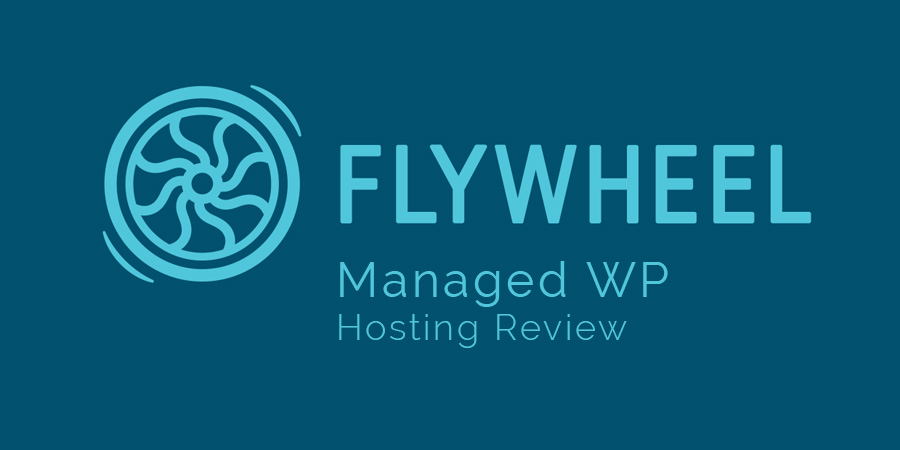
Back with another WordPress Hosting review, this time it’s Flywheel turn. In this article I’m going to explore the ups and downs of this very decent hosting service for WordPress that has plenty of options. Scalable plans, free migrations, staging sites, nightly backups, free SSL are only some of the features you’ll find at Flywheel. Keep reading to see our review of their service, or click the link to visit their website to learn more.
Creating a New Website with Flywheel
Flywheel has a very particular way to start your experience with the service. They don’t let you choose a plan right away so I’ve decided to show you the process just as I’ve experienced it. Payment does not come first with Flywheel as they let you setup your demo site first.
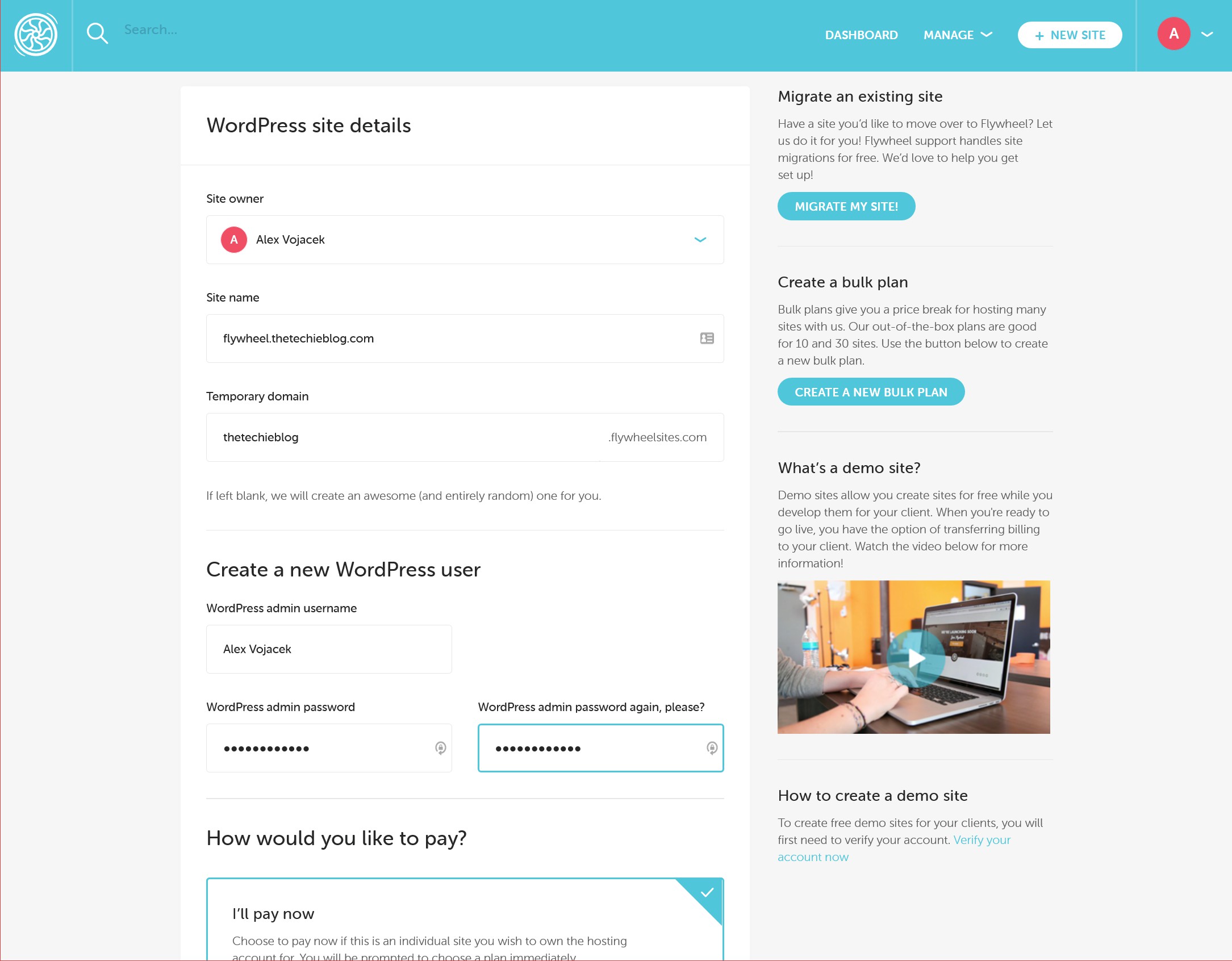
Just fill in all the information and then you’re ready to create your first site. Up until that moment, there are no plans presented whatsoever. This is a very unique way to get started. Flywheel has made it easy for people who want to demo the service (or use it to being building a demo website for a client) but it may become inconvenient for those that consider payment and setup as two completely separate things.
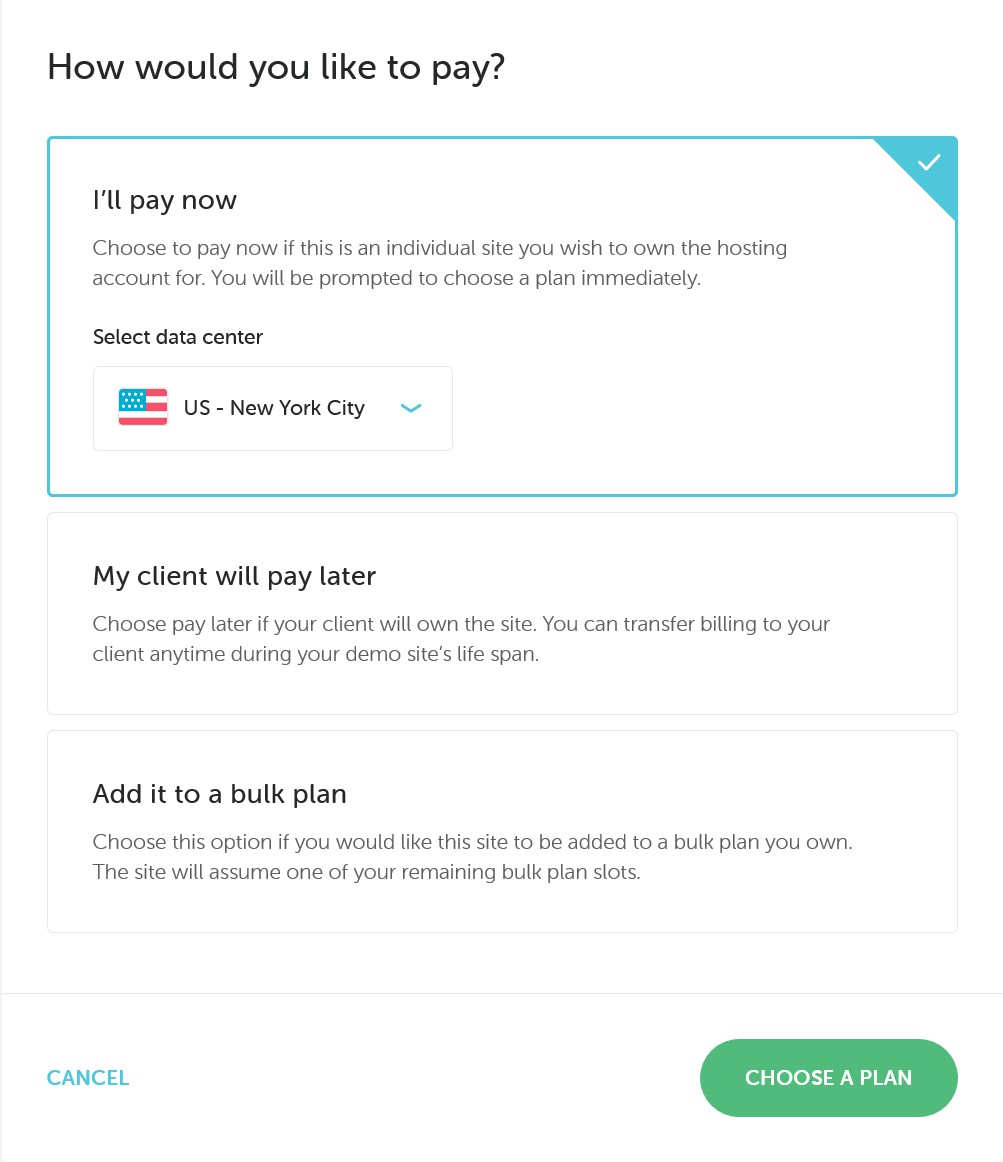
Flywheel lets you pay by two ways: either pay yourself or let your client make payments once they take over the site (note: you can also add a site to bulk plans you already have).

Once you decide how you want to pay, you’re free to choose a plan and after that… it’s creation time. I like that Flywheel has made it easy for people who want to start a demo of the service, and the setup makes a lot of sense for freelancers. But it since not all users will land on the the ricing page before beginning having the plans information accessible during the signup process would be nice.
Flywheel Hosting Plans
Here are the current plans for Flywheel. They offer fully managed WordPress hosting plans build on the Google Cloud platform. So server settings are configured and WordPress already installed when you signup.
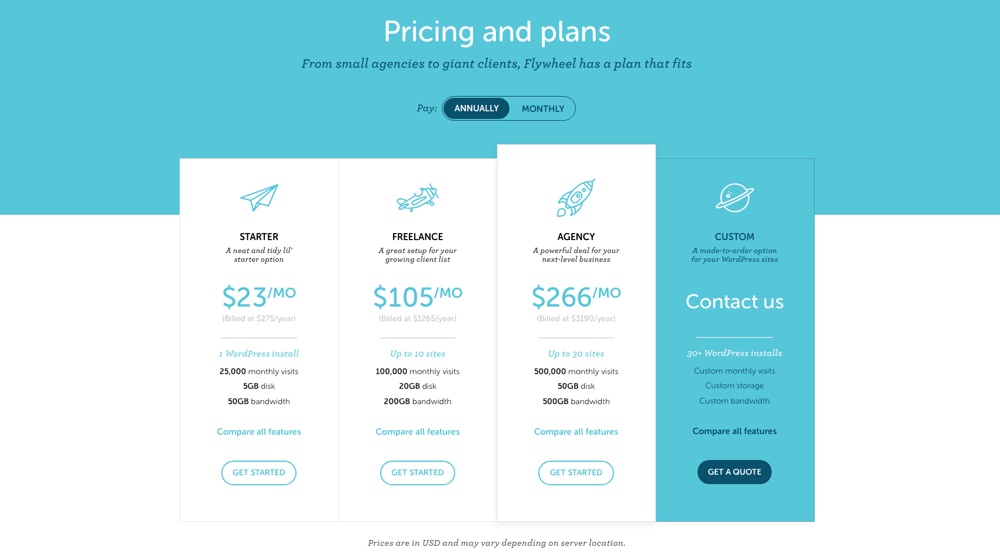
For this review I’ve chosen the Starter Plan. Flywheel has an adequate set of resources, it’s a little more expensive than the competition but it has SSL included and the option for CDN is affordable enough. The only real drawback of their plans is the limited storage space, which for most blogs won’t be an issues but could become a problem for medium to large sites (specifically resource heavy or high traffic sites).
Migrate Your WordPress Site to Flywheel
The ideal way for me to start working on the site is to import the current benchmark site so I’ve tested the migration mechanism, as always.
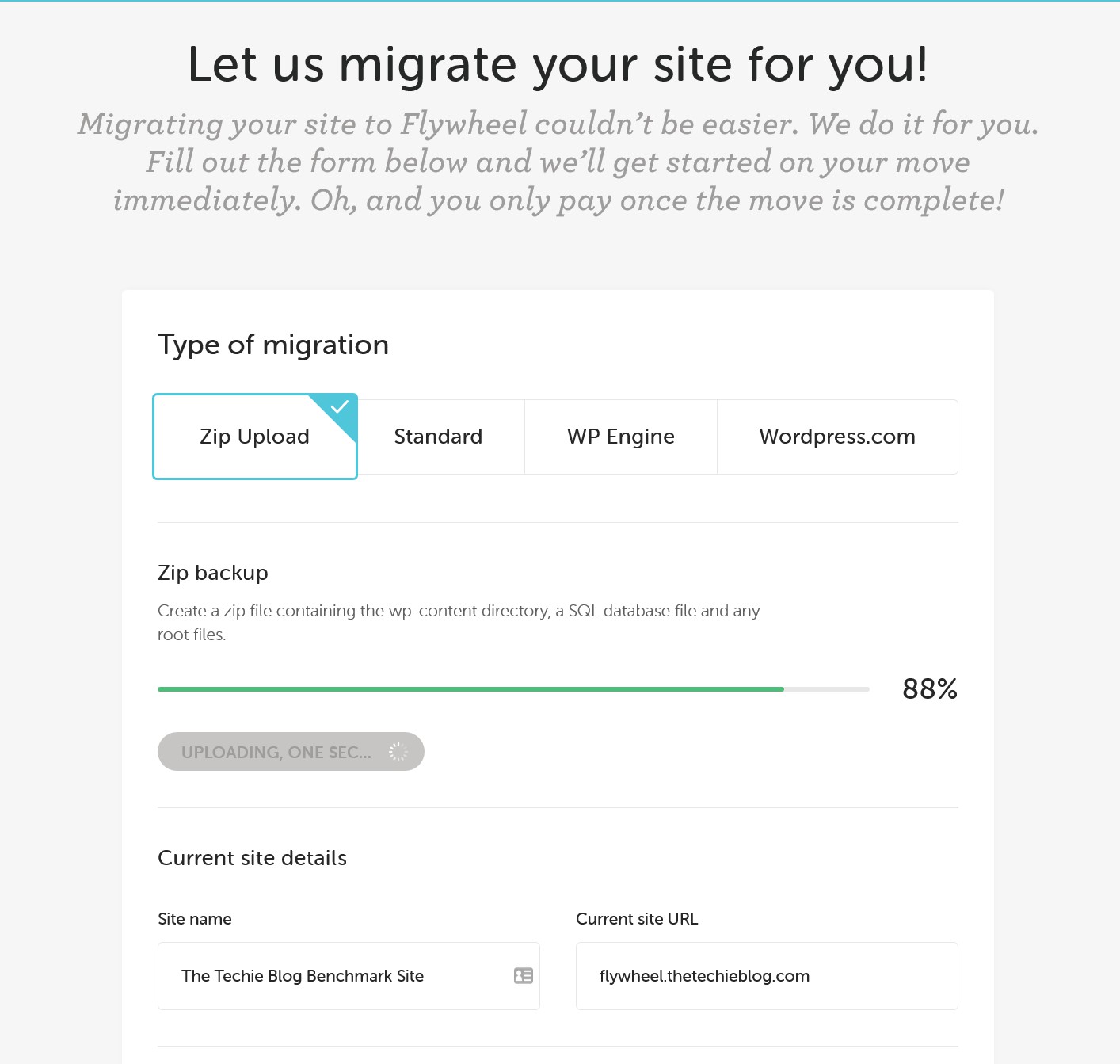
The are several ways you could import your current site: the usual way (here’s a great starter guide to migrate to WordPress), providing credentials to your current WP site and FTP access, directly via WordPress.com (which is a good addition) or through a ZIP upload – which is just the perfect method for me. Flywheel is confident enough you’ll want to go from WP Engine to Flywheel they even included that option in there too!
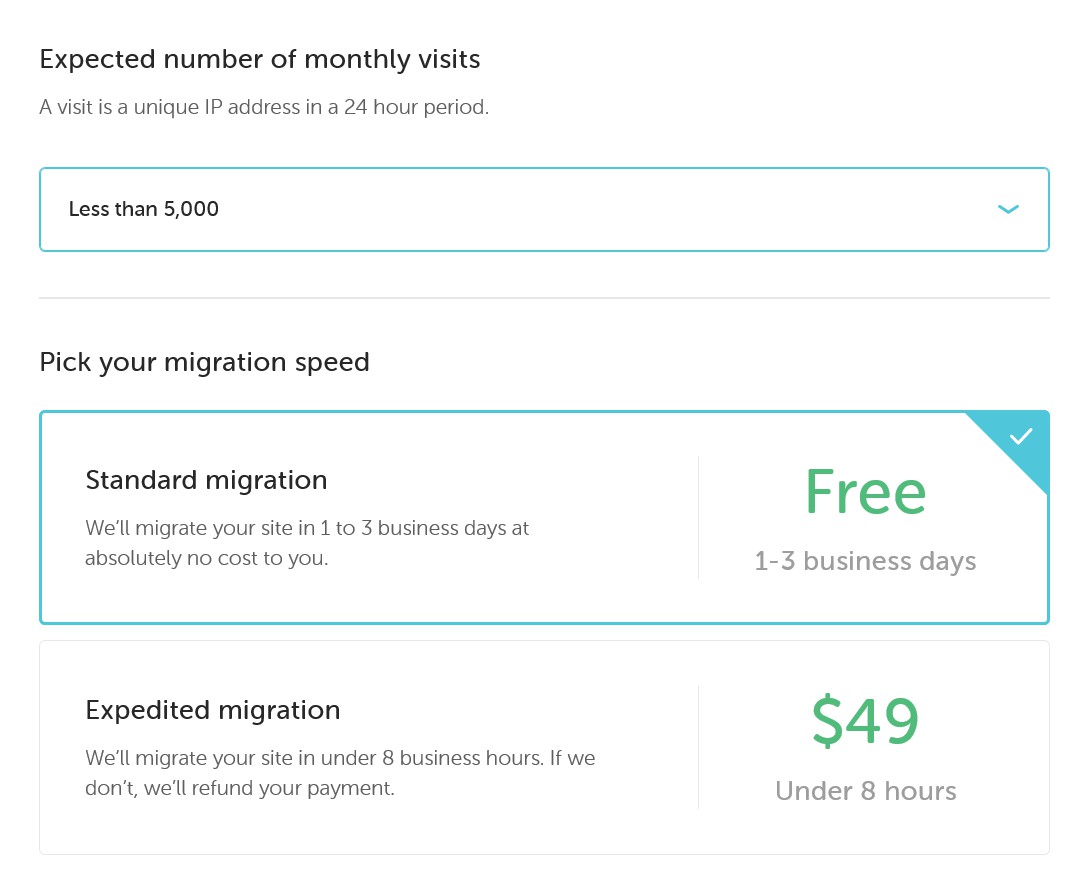
Once you make up your mind on what kind of migration method you want, Flywheel will let you choose the type of migration, either a Standard migration which can take up to 3 business days and it’s free or the Expedited migration that is said to be done in less than 8 hours.
Even though I’ve properly zipped the file, that method didn’t work for me and got stuck at 99% so I contacted tech support for assistance. They responded very rapidly and asked me to send them the zip file, which I did. The migration was done in less than 10 minutes without any extra charge involved so, unless your site is really huge, there is really no need to pay for an Expedited migration as the regular service works just fine.
Flywheel Panel Options
Once the site is setup, defining the domain is one the easiest things to do. Flywheel gives you access to all your DNS settings and they actually encourage you to edit them as needed.
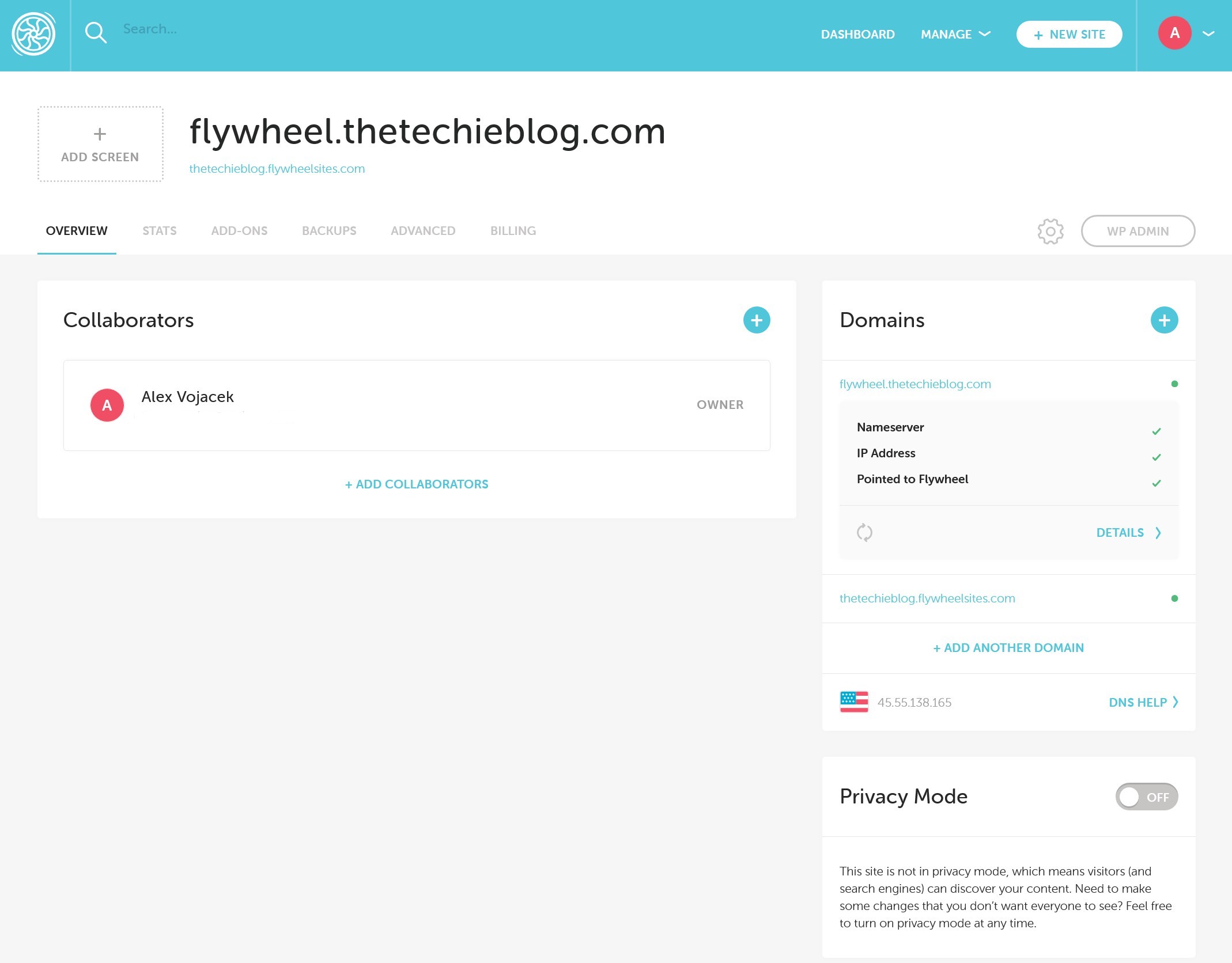
This could be a confusing for new users, but for people who know where their domains are pointing Flywheel will not get in your way. They let you define your domains easily and will give you the coordinates to their CNAME defined names and respective IPs. They even provide an easy tool for you to check if the DNS entries are loaded properly.
Flywheel is about the least intrusive and easy to work service for domains and DNS. It’s like they’re telling you: “we know you want to setup your domain so, here is the data, point your domain and check if it’s working… we won’t get in the way” and that’s just perfect.
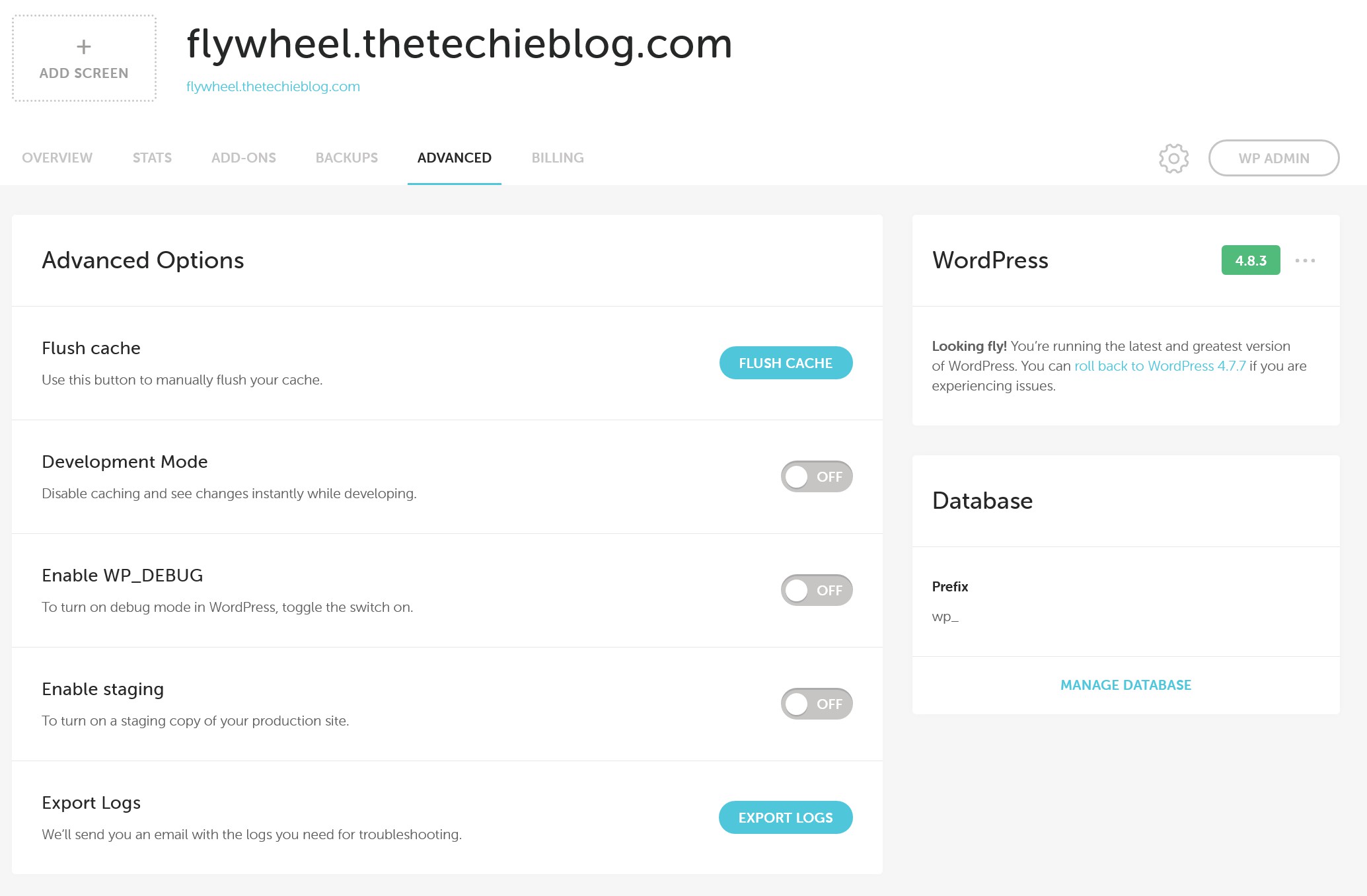
Once the domain is setup properly, the main panel will let you control the Cache on your WP site, enable the Debug mode and even disable the Cache to see changes instantly. Flywheel does seem to be caching WordPress with their own custom webserver architecture.
Extra Flywheel Services
On top of the usual stuff, Flywheel provides support for backups. While it’s still a good idea to backup WordPress regularly on your own, this is a great backup for your backups.
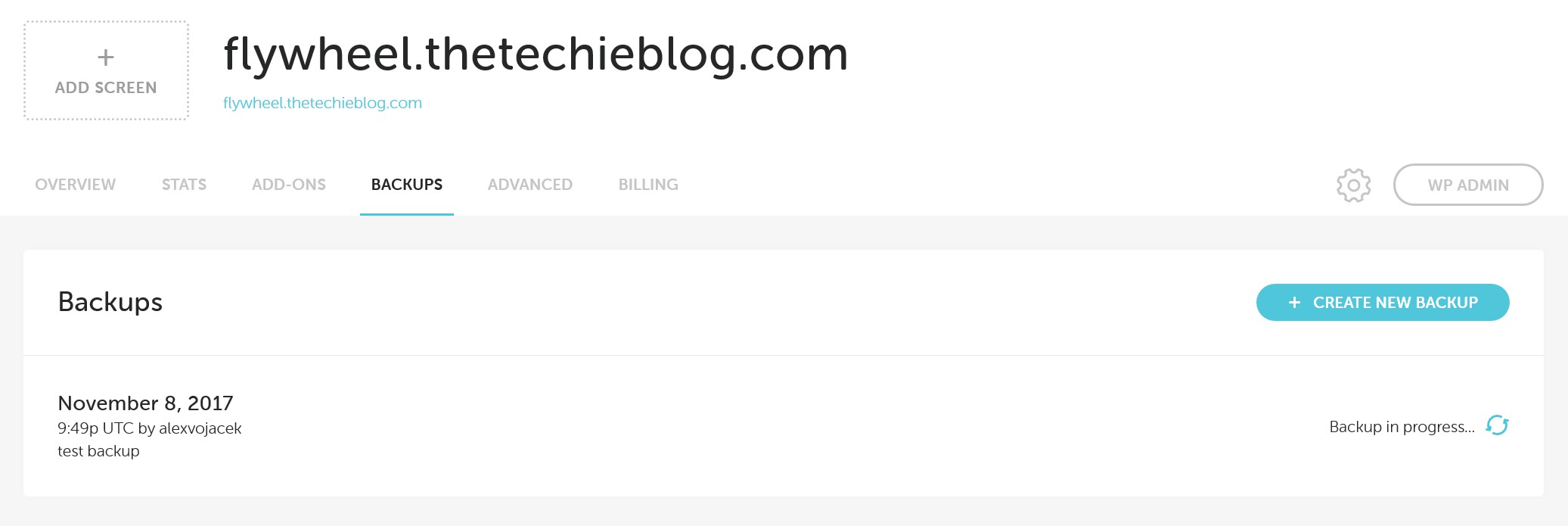
And if that’s not enough, Flywheel will let you enable a multisite service for $10/mo extra and a CDN service for $10 more.
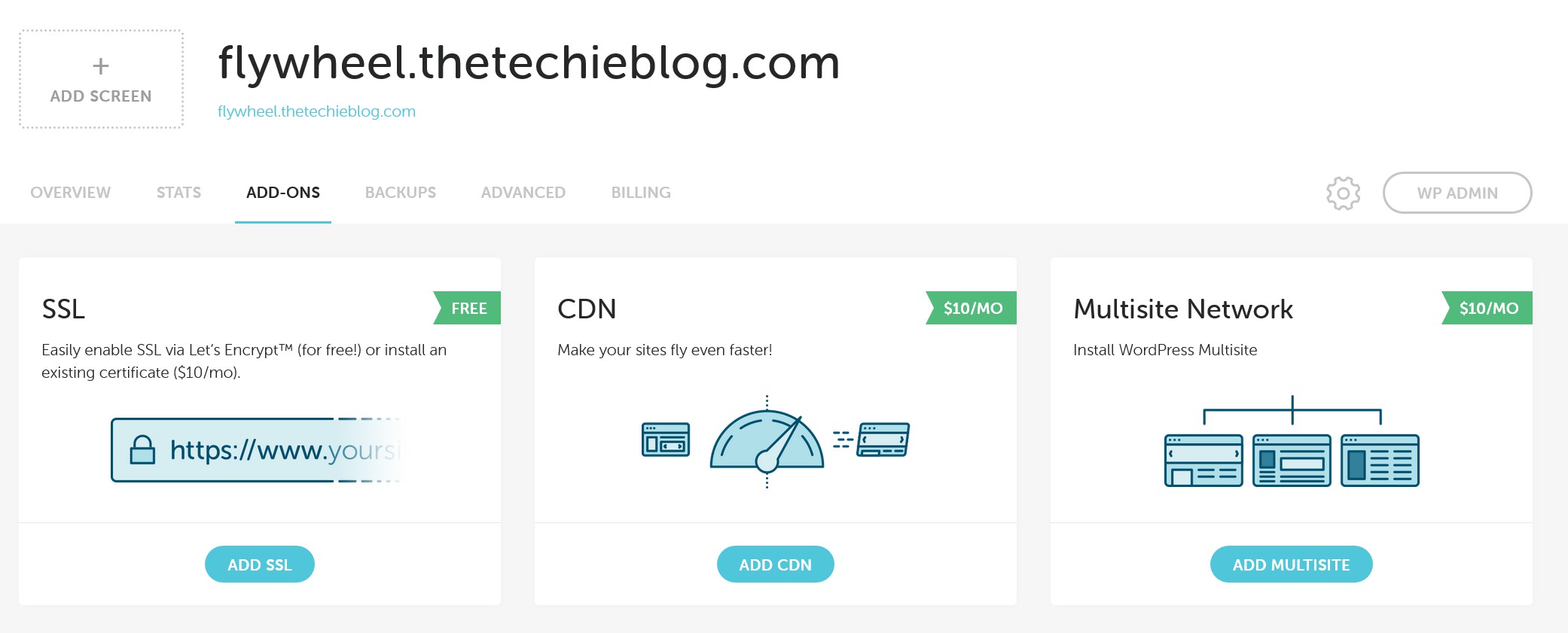
Certificates are free as long as you use Let’s Encrypt but installing your own certificate through Flywheel will cost you $10 month which is not good. For most users paying an extra $10 a month for a custom certificate is probably not worth it. Having your own certificate is not much different than using the built in Let’s Encrypt, so we’d recommend the free option for most.
If you’re in need of building your own store with your custom certificate you’re probably better off with another service that does not charge you a monthly fee.
Local by Flywheel

Another exclusive feature is Local by Flywheel. With Local you can design, build and test your website locally (on your computer) then quickly and easy push your design to your live site hosted on Flywheel. Best of all – this is a free feature that works great with all Flywheel plans.
24/7 Customer Support
Run into an issue at 1am? No problem. Flywheel recently revamped their support system to be able to offer customers help 24 hours a day, seven days a week, 365 days a year (yes, even holidays). Best of all it’s actual human support, and not just a chatbot.
Bonus Add-ons

And to top it all off, there are a few more add-ons you might be interested to know that Flywheel offers.
Performance Insights: Speed up your site with Flywheel’s help. Monthly speed summaries and quarterly audits will keep you on track.
Plugins Updates: If you forget to keep things up to date, your hosting will remember for you. Regular, monthly plugin updates can help keep your site secure (though we always recommend testing updates yourself on a local or staging site).
Security Insights: Just like your speed, you can keep your site secure by keeping track of your monthly and quarterly reports from Flywheel.
White Labeling: If you’re a designer, Flywheel makes resale hosting easy. A white labeled platform makes it easy to add your branding and resell to your clients.
Flywheel Hosting Performance
So how does Flywheel compare to the rest? Let’s put the service to the test.

Website performance is very good, with a response time of less than 1.5 seconds and a solid A score from Pingdom.
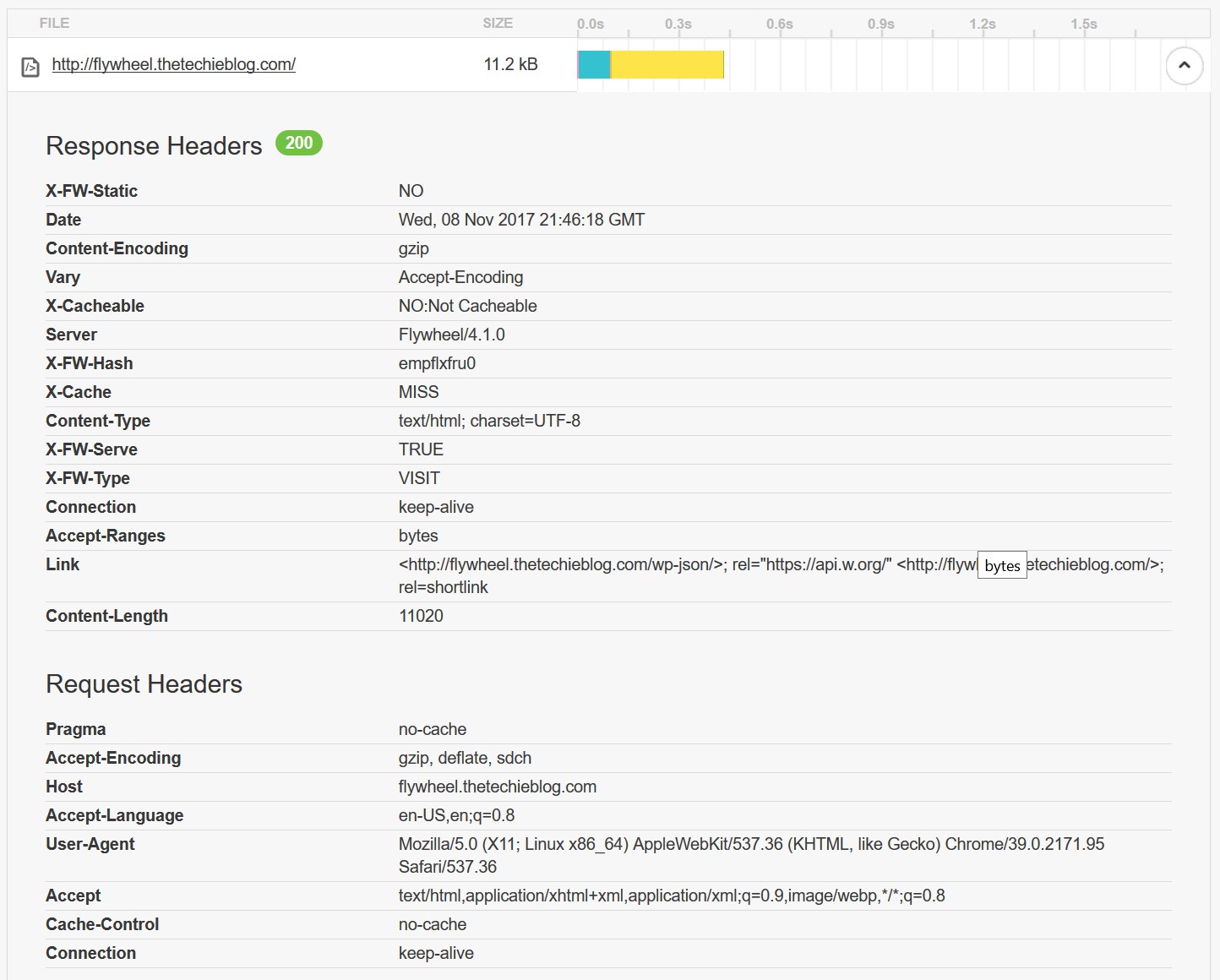
Watching the header response closely you can see that Flywheel is using a custom webserver configuration that appears to be quite optimized for the task.

A test from the Australia server also gives an excellent result with another A. Good job!
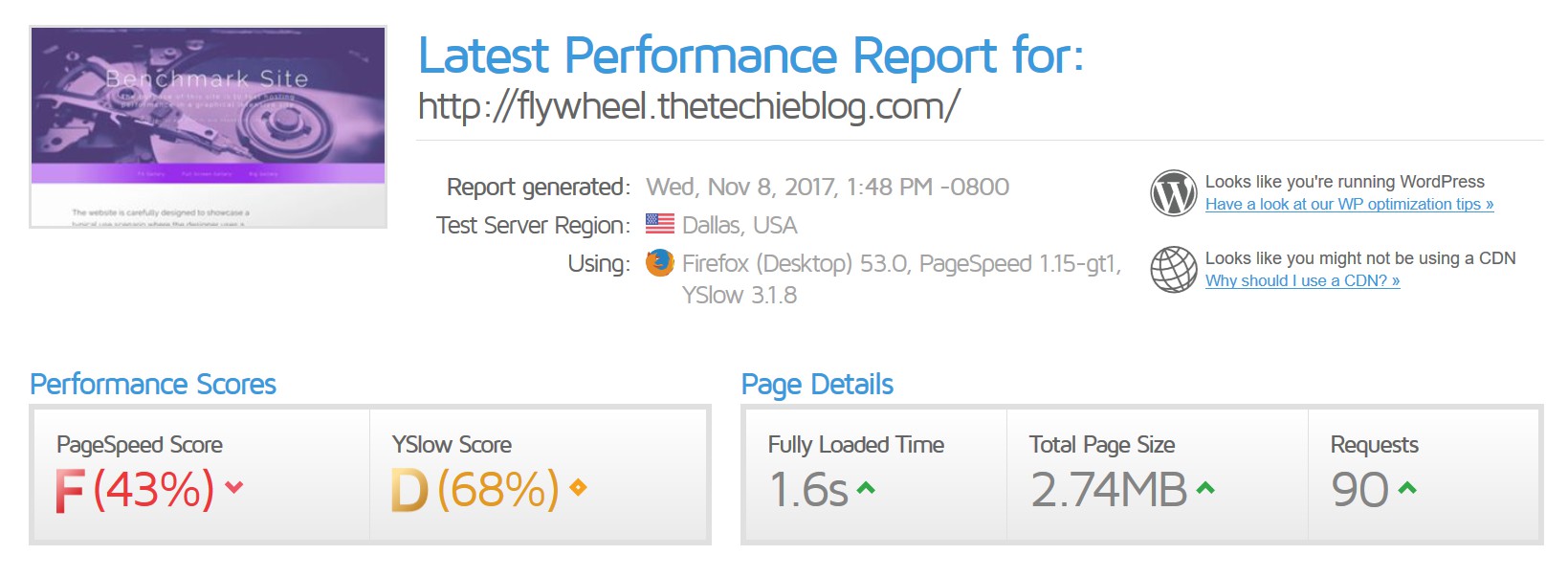
GTMetrix also shows a superb result and the website loaded in 1.6s confirming that Flywheel does have a nice webserver & cache in place, making this a fine service for any WP addict that needs a very good performance.
What I Liked
Flywheel has a nice intuitive and easy to use interface with standard options but tons of extras. I loved the “we do not get in your way” attitude towards the domains & DNS setup as this is ideal for a quick setup, specially for professionals.
I also liked the way they respond to tickets. The support staff are happy to help and quick on fixes. And I most certainly liked the performance.
What I didn’t like
Having a nice service with a very restrictive storage space is not nice and having to pay tons of money for an even more expensive service just to use more space is not fun at all. I would loved to have more storage space options to the mix. There are tons of blogs & magazines that does not get that many visits but consumes a lot of storage space and Flywheel will be a very costly service for that kind of activity.
I do think the sign up process could be better as the plans are not visible until after you setup your website and choose a form of payment. This needs to improve. Either offer a free demo (with the 14-day limitation visible) or require the user to signup & add payment info first (then setup after) – mixing the two is confusing.
Also Flywheel doesn’t currently offer any e-mail options which could be a problem. Though we can highly recommend G-suite if you want to manage emails yourself.
Wrapping Up
Flywheel is a solid hosting option. The intuitive and easy to use interface combined with extras such as backups, staging, ability to add free SSL certificates, multisite compatibility and optional CDN makes for quite a good deal. Also Flywheel offers one of the least intrusive methods for setting up domains and DNS (aka we don’t stand in your way attitude) and that is a nice gesture.
Plus if you are a freelance web designer there are some extra features like the option to choose client billing and Local (which you can use to connect your local development site to you live client sites).
On the other side of the table the storage space is very limited and Flywheel is somewhat expensive. But if you don’t require tons of space, it’s a good service with excellent performance and tech support. For more information, be sure to visit their website.
Overall we think Flywheel is a pretty good managed WordPress hosting service, but what do you think? Have you tried Flywheel? Or do you have any other questions about their hosting? Let us know in the comments.



I tried Flywheel and overall think they offer a pretty good setup. Installation was a breeze although I had to futz around with DNS a good bit. Ultimately what made decide to stick with my Siteground was 1) it’s Siteground and 2) the lack of access to the back end. I like to have control of my environment but then again I’m OCD. I’m sure Flywheel does a fine job of handling that side but I just like being able to handle the configuration and handlers myself.